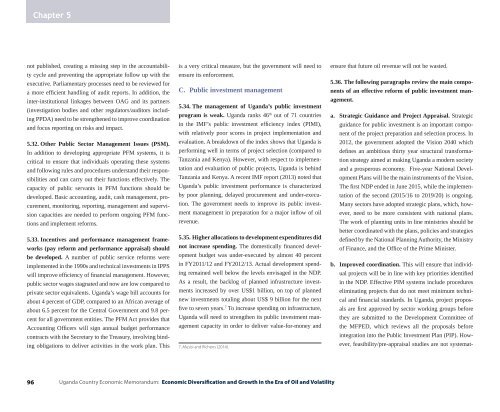Economic Diversification and Growth
71mK301zeG0
71mK301zeG0
Create successful ePaper yourself
Turn your PDF publications into a flip-book with our unique Google optimized e-Paper software.
Chapter 5<br />
not published, creating a missing step in the accountability<br />
cycle <strong>and</strong> preventing the appropriate follow up with the<br />
executive. Parliamentary processes need to be reviewed for<br />
a more efficient h<strong>and</strong>ling of audit reports. In addition, the<br />
inter-institutional linkages between OAG <strong>and</strong> its partners<br />
(investigation bodies <strong>and</strong> other regulators/auditors including<br />
PPDA) need to be strengthened to improve coordination<br />
<strong>and</strong> focus reporting on risks <strong>and</strong> impact.<br />
5.32. Other Public Sector Management Issues (PSM).<br />
In addition to developing appropriate PFM systems, it is<br />
critical to ensure that individuals operating these systems<br />
<strong>and</strong> following rules <strong>and</strong> procedures underst<strong>and</strong> their responsibilities<br />
<strong>and</strong> can carry out their functions effectively. The<br />
capacity of public servants in PFM functions should be<br />
developed. Basic accounting, audit, cash management, procurement,<br />
monitoring, reporting, management <strong>and</strong> supervision<br />
capacities are needed to perform ongoing PFM functions<br />
<strong>and</strong> implement reforms.<br />
5.33. Incentives <strong>and</strong> performance management frameworks<br />
(pay reform <strong>and</strong> performance appraisal) should<br />
be developed. A number of public service reforms were<br />
implemented in the 1990s <strong>and</strong> technical investments in IPPS<br />
will improve efficiency of financial management. However,<br />
public sector wages stagnated <strong>and</strong> now are low compared to<br />
private sector equivalents. Ug<strong>and</strong>a’s wage bill accounts for<br />
about 4 percent of GDP, compared to an African average of<br />
about 6.5 percent for the Central Government <strong>and</strong> 9.8 percent<br />
for all government entities. The PFM Act provides that<br />
Accounting Officers will sign annual budget performance<br />
contracts with the Secretary to the Treasury, involving binding<br />
obligations to deliver activities in the work plan. This<br />
is a very critical measure, but the government will need to<br />
ensure its enforcement.<br />
C. Public investment management<br />
5.34. The management of Ug<strong>and</strong>a’s public investment<br />
program is weak. Ug<strong>and</strong>a ranks 46 th out of 71 countries<br />
in the IMF’s public investment efficiency index (PIMI),<br />
with relatively poor scores in project implementation <strong>and</strong><br />
evaluation. A breakdown of the index shows that Ug<strong>and</strong>a is<br />
performing well in terms of project selection (compared to<br />
Tanzania <strong>and</strong> Kenya). However, with respect to implementation<br />
<strong>and</strong> evaluation of public projects, Ug<strong>and</strong>a is behind<br />
Tanzania <strong>and</strong> Kenya. A recent IMF report (2013) noted that<br />
Ug<strong>and</strong>a’s public investment performance is characterized<br />
by poor planning, delayed procurement <strong>and</strong> under-execution.<br />
The government needs to improve its public investment<br />
management in preparation for a major inflow of oil<br />
revenue.<br />
5.35. Higher allocations to development expenditures did<br />
not increase spending. The domestically financed development<br />
budget was under-executed by almost 40 percent<br />
in FY2011/12 <strong>and</strong> FY2012/13. Actual development spending<br />
remained well below the levels envisaged in the NDP.<br />
As a result, the backlog of planned infrastructure investments<br />
increased by over US$1 billion, on top of planned<br />
new investments totaling about US$ 9 billion for the next<br />
five to seven years. 7 To increase spending on infrastructure,<br />
Ug<strong>and</strong>a will need to strengthen its public investment management<br />
capacity in order to deliver value-for-money <strong>and</strong><br />
7. Musisi <strong>and</strong> Richens (2014).<br />
ensure that future oil revenue will not be wasted.<br />
5.36. The following paragraphs review the main components<br />
of an effective reform of public investment management.<br />
a. Strategic Guidance <strong>and</strong> Project Appraisal. Strategic<br />
guidance for public investment is an important component<br />
of the project preparation <strong>and</strong> selection process. In<br />
2012, the government adopted the Vision 2040 which<br />
defines an ambitious thirty year structural transformation<br />
strategy aimed at making Ug<strong>and</strong>a a modern society<br />
<strong>and</strong> a prosperous economy. Five-year National Development<br />
Plans will be the main instruments of the Vision.<br />
The first NDP ended in June 2015, while the implementation<br />
of the second (2015/16 to 2019/20) is ongoing.<br />
Many sectors have adopted strategic plans, which, however,<br />
need to be more consistent with national plans.<br />
The work of planning units in line ministries should be<br />
better coordinated with the plans, policies <strong>and</strong> strategies<br />
defined by the National Planning Authority, the Ministry<br />
of Finance, <strong>and</strong> the Office of the Prime Minister.<br />
b. Improved coordination. This will ensure that individual<br />
projects will be in line with key priorities identified<br />
in the NDP. Effective PIM systems include procedures<br />
eliminating projects that do not meet minimum technical<br />
<strong>and</strong> financial st<strong>and</strong>ards. In Ug<strong>and</strong>a, project proposals<br />
are first approved by sector working groups before<br />
they are submitted to the Development Committee of<br />
the MFPED, which reviews all the proposals before<br />
integration into the Public Investment Plan (PIP). However,<br />
feasibility/pre-appraisal studies are not systemat-<br />
96<br />
Ug<strong>and</strong>a Country <strong>Economic</strong> Memor<strong>and</strong>um: <strong>Economic</strong> <strong>Diversification</strong> <strong>and</strong> <strong>Growth</strong> in the Era of Oil <strong>and</strong> Volatility


